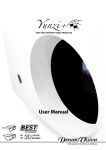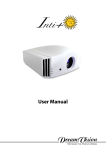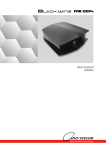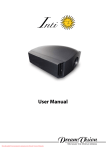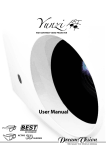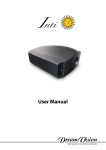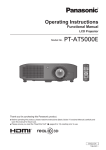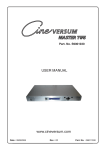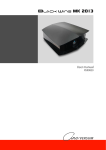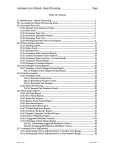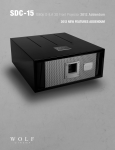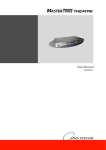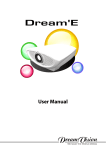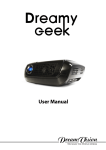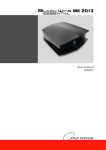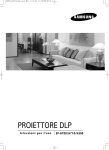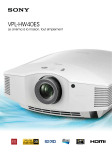Download the manual (5.1 Mo - pdf)
Transcript
THE ULTIMATE 3D EXPERIENCE ACTIVE GLASSES Changes Dreamvision provides this manual ‘as is’ without warranty of any kind, either expressed or implied, including but not limited to the implied warranties or merchantability and fitness for a particular purpose. Dreamvision may make improvements and/or changes to the product(s) and/or the program(s) described in this publication at any time without notice. This publication could contain technical inaccuracies or typographical errors. Changes are periodically made to the information in this publication; these changes are incorporated in new editions of this publication. Copyright All right reserved. No part of this document may be copied, reproduced or translated. It shall not otherwise be recorded, transmitted or stored in a retrieval system without the prior written consent of Dreamvision. Guarantee Dreamvision provides a guarantee relating to perfect manufacturing as part of the legally stipulated terms of guarantee. On receipt, the purchaser must immediately inspect all delivered goods for damage incurred during transport, as well as for material and manufacturing faults. Dreamvision must be informed immediately in writing of any complaints. If the purchaser or third party caries out modifications or repairs on goods delivered by Dreamvision, or if the goods are handle incorrectly, in particular if the systems are commissioned operated incorrectly or if, after the transfer of risks, the goods are subject to influences not agreed upon in the contract, all guarantee claims of the purchaser will be rendered invalid. Not included in the guarantee coverage are system failures which are attributed to programs or special electronic circuitry provided by the purchaser, e.g. interfaces. Normal wear as well as normal maintenance are not subject to the guarantee provided by Dreamvision either. The environmental conditions as well as the servicing and maintenance regulations specified in this manual must be complied with by the customer. Trademarks Brand and product names mentioned in this manual may be trademarks, registered trademarks or copyrights of their respective holders. All brands and product names mentioned in this manual serve as comments or examples and are not to be understood as advertising for the products of their manufactures. 2 R699850 - Siglos User Manual TABLE OF CONTENTS 1.0 SAFETY INSTRUCTIONS......................................................................................................5 1.1 Important Information.....................................................................................................................5 1.2 Regional Specific Information........................................................................................................5 1.3 Important Safeguards......................................................................................................................5 2.0 INSTALLATION GUIDELINES............................................................................................7 2.1 Introduction.....................................................................................................................................7 2.2 THX-3D Display Certification........................................................................................................7 2.3 Environment of Use........................................................................................................................8 2.4 Air-Flow and Space Requirements..................................................................................................8 2.5 Ceiling Mounting the Unit..............................................................................................................8 2.6 Projection Distance.........................................................................................................................9 2.7 Setting the Lens and using Lens Memories....................................................................................9 3.0 REMOTE CONTROL UNIT (RCU)...................................................................................11 4.0 GETTING STARTED............................................................................................................ 12 4.1 General View.................................................................................................................................12 4.2 Connecting the Power Cord..........................................................................................................12 4.3 Operating and Navigation Buttons................................................................................................13 5.0 CONNECTIONS..................................................................................................................... 13 5.1 Caution when connecting a Device to HDMI Input......................................................................13 5.2 Connecting a Video Source to the Projector.................................................................................14 5.3 Connecting an Automation or Control device...............................................................................14 6.0 MENU STRUCTURE............................................................................................................. 15 7.0 PICTURE ADJUST................................................................................................................ 18 7.1 Picture Modes and Color Profiles..................................................................................................18 7.2 Advanced Picture Mode................................................................................................................19 7.3 Advanced Color Profile.................................................................................................................20 7.4 Color Temperature.........................................................................................................................20 7.5 Advanced Color Temperature........................................................................................................20 7.6 Gamma..........................................................................................................................................20 7.7 Advanced Gamma.........................................................................................................................21 7.8 Multiple Pixel Control Level (MPC Level)..................................................................................21 7.9 Clear Motion Drive (400Hz).........................................................................................................22 7.10 Contrast.........................................................................................................................................22 7.11 Brightness......................................................................................................................................22 7.12 Color..............................................................................................................................................22 7.13 Tint................................................................................................................................................22 8.0 INPUT SIGNAL....................................................................................................................... 22 8.1 Input Level....................................................................................................................................22 8.2 Color Space...................................................................................................................................22 8.3 Control with HDMI (CEC*).........................................................................................................22 8.4 Aspect Ratio..................................................................................................................................23 8.5 Progressive (only 480i, 576i, 1080i).............................................................................................23 8.6 Mask..............................................................................................................................................23 8.7 Picture Position.............................................................................................................................23 9.0 3D CONTENT AND 3D PROJECTION............................................................................ 23 9.1 General Information about 3D playback.......................................................................................23 9.2 Projector 3D Settings....................................................................................................................24 10.0 INSTALLATION..................................................................................................................... 24 10.1 Lens Control..................................................................................................................................24 10.2 Pixel Adjust...................................................................................................................................25 10.3 Keystone (Vertical)........................................................................................................................26 10.4 Pincushion.....................................................................................................................................26 R699850 - Siglos User Manual 3 10.5 Anamorphic (works with 3D signal).............................................................................................26 10.6 High Altitude Mode.......................................................................................................................26 10.7 Environment Setting......................................................................................................................26 11.0 DISPLAY SETUP.................................................................................................................... 27 12.0 FUNCTION............................................................................................................................... 27 12.1 Trigger...........................................................................................................................................27 12.2 Off-Timer......................................................................................................................................27 12.3 ECO Mode.....................................................................................................................................27 12.4 Network.........................................................................................................................................27 12.5 Remote Code A or B......................................................................................................................28 12.6 Lamp Reset....................................................................................................................................28 13.0 INFORMATION MENU....................................................................................................... 28 14.0 CINEMASCOPE SETUPS.................................................................................................... 28 14.1 Lens Zoom or 2.35 Theater System kit.........................................................................................28 14.2 Cinemascope setup with Lens Zoom............................................................................................29 14.3 Installing a 2.35:1 screen with the 2.35 Theater System kit..........................................................29 15.0 MAINTENANCE.................................................................................................................... 30 15.1 Cleaning and Replacing the Dust Filters.......................................................................................30 15.2 Dirt on the Lens.............................................................................................................................31 15.3 Replacing the Lamp......................................................................................................................31 15.4 Troubleshooting.............................................................................................................................32 16.0 MISCELLANEOUS................................................................................................................ 33 16.1 RS-232C protocol..........................................................................................................................33 16.2 LAN protocol................................................................................................................................37 16.3 Infra Red, long hex-pronto compatible RCU................................................................................38 16.4 Specifications................................................................................................................................39 4 R699850 - Siglos User Manual SAFETY INSTRUCTIONS 1.0 SAFETY INSTRUCTIONS 1.1 Important Information Lead-free regulation This product has a High Intensity Discharge (HID) lamp that contains a small amount of mercury. It also contains lead in some components. Disposal of these materials may be regulated in your community due to environmental considerations. For disposal or recycling information please contact your local authorities, or the Electronics Industries Alliance: http://www.eiae.org. Information for Users on Disposal of Old Equipment This symbol indicates that the electrical and electronic equipment should not be disposed as general household waste at its end of life. Instead, the product should be handed over to the applicable collection point for the recycling of electrical and electronic equipment for proper treatment, recovery and recycling in accordance with your national legislation. By disposing of this product correctly, you will help to conserve natural resources and will help prevent potential negative effects on the environment and human health which could otherwise be caused by inappropriate waste handling of this product. For more information about collection point and recycling of this product, please contact your local municipal office, your household waste disposal service or the shop where you purchased the product. Penalties may be applicable for incorrect disposal of this waste, in accordance with national legislation. 1.2 Regional Specific Information CE mark and Directive 2011/65/EU - ROHS 2 (Europe only) In accordance with Article 7 and the adoption into national law by 2nd January 2013, this product has been designed and manufactured in accordance with Article 4. The technical documentation and the written declaration of conformity that assesses the product conformity can be provided to the competent National Authority upon an email request to: [email protected] Other Countries outside the European Union: If you wish to dispose of this product, please do so in accordance with applicable national legislation or other rules in your country for the treatment of old electrical and electronic equipment. FCC Information (USA only) Changes or modification not approved by Dreamvision could void the user’s authority to operate the equipment. Note: This equipment has been tested and found to comply with the limits for Class B digital devices, pursuant to Part 15 of the FCC Rules. These limits are designed to provide reasonable protection against harmful interference in a residential installation. This equipment generates, uses, and can radiate radio frequency energy and, if not installed and used in accordance with the instructions, may cause harmful interference to radio communications. However, there is no guarantee that interference will not occur in a particular installation. About the installation place Do not install the projector in a place that cannot support its weight securely. If the installation place is not sturdy enough, the projector could fall or overturn, possibly causing personal injury. To reduce the risk of electric shock, do not remove cover. Refer servicing to qualified service personnel. This projector is equipped with a 3-blade grounding type plug to satisfy FCC rule. If you are unable to insert the plug into the outlet, contact your electrician. To prevent fire or shock hazards, do not expose this appliance to rain or moisture. This apparatus must be earthed. 1.3 Important Safeguards Electrical energy can perform many useful functions. This unit has been engineered and manufactured to assure your personal safety. IMPROPER USE CAN RESULT IN POTENTIAL ELECTRICAL SHOCK OR FIRE R699850 - Siglos User Manual 5 SAFETY INSTRUCTIONS HAZARD. In order not to defeat the safeguards incorporated into this product, observe the following basic rules for its installation, use and service. The power input is auto-ranging from 100 to 240 VAC. Please read these Important Safeguards carefully before use. • All the safety and operating instructions should be read before the product is operated. • All warnings on the product and in the operating instructions should be adhered to. • All operating instructions should be followed. • Place the projector near a wall outlet where the plug can be easily unplugged. • Unplug this product from the wall outlet before cleaning. Do not use liquid cleaners or aerosol cleaners. Use a damp cloth for cleaning. • Do not use attachments not recommended by the product manufacturer as they may be hazardous. • Do not use this product near water. Do not use immediately after moving from a low temperature to high temperature, as this causes condensation, which may result in fire, electric shock, or other hazards. • Do not place this product on an unstable cart, stand, or table. The product may fall, causing serious injury to a child or adult, and serious damage to the product. The product should be mounted according to the manufacturer’s instructions, and should use a mount recommended by the manufacturer. • When the product is used on a cart, care should be taken to avoid quick stops, excessive force, and uneven surfaces which may cause the product and cart to overturn, damaging equipment or causing possible injury to the operator. Slots and openings are provided for ventilation must not be blocked or covered. Do not place this unit on a bed, sofa, rug or other similar surface. • This product should be operated only with the type of power source indicated on the label. If you are not sure of the type of power supply to your home, consult your product dealer or local power company. • This product is equipped with a three-wire plug. This plug will fit only into a grounded power outlet. If you are unable to insert the plug into the outlet, contact your electrician to install the proper outlet. Do not defeat the safety purpose of the grounded plug. • Power-supply cords should be routed so that they are not likely to be walked on or pinched by items placed upon or against them. Pay particular attention to cords at doors, plugs, receptacles, and the point where they exit from the product. • For added protection of this product during a lightning storm, or when it is left unattended and unused for long periods of time, unplug it from the wall outlet and disconnect the cable system. This will prevent damage to the product due to lightning and power line surges. • Do not overload wall outlets, extension cords, or convenience receptacles on other equipment as this can result in a risk of fire or electric shock. • Never push objects of any kind into this product through openings as they may touch dangerous voltage points or short out parts that could result in a fire or electric shock. Never spill liquid of any kind on the product. • Do not attempt to service this product yourself as opening or removing covers may expose you to dangerous voltages and other hazards. Refer all service to qualified service personnel. • Unplug this product from the wall outlet and refer service to qualified service personnel under the following conditions: a) When the power supply cord or plug is damaged. b) If liquid has been spilled, or objects have fallen on the product. c) If the product has been exposed to rain or water. d) If the product does not operate normally by following the operating instructions. Adjust only those controls that are covered by the Operation Manual, as an improper adjustment of controls may result in damage and will often require extensive work by a qualified technician to restore the product to normal operation. e) If the product has been dropped or damaged in any way. f) When the product exhibits a distinct change in performance - this indicates a need for service. • When replacement parts are required, be sure the service technician has used replacement parts specified by the manufacturer or with same characteristics as the original part. Unauthorized substitutions may result in fire, electric shock, or other hazards. • Upon completion of any service or repairs to this product, ask the service technician to perform safety checks to determine that the product is in proper operating condition. • The product should be placed more than one foot away from heat sources such as radiators, heat registers, 6 R699850 - Siglos User Manual INSTALLATION GUIDELINES stoves, and other products (including amplifiers) that produce heat. • When connecting other products such as VCR’s, and personal computers, you should turn off the power of this product for protection against electric shock. • Do not place combustible behind the cooling fan. For example, cloth, paper, matches, aerosol cans or gas lighters that present special hazards when over heated. Do not look into the inside of this unit through vents (ventilation holes). Do not look at the illumination lamp directly by opening the cabinet while the illumination lamp is turned on. The illumination lamp also contains ultraviolet rays and the light is so powerful that your eyesight can be impaired. • Do not drop, hit, or damage the light-source lamp (lamp unit) in any way. It may cause the lightsource lamp to break and lead to injuries. Do not use a damaged light source lamp. If the lightsource lamp is broken, ask your dealer to repair it. Fragments from a broken light-source lamp may cause injuries. • The light-source lamp used in this projector is a high pressure mercury lamp. Be careful when disposing of the light source lamp. If anything is unclear, please consult your dealer. • Do not ceiling-mount the projector to a place which tends to vibrate; otherwise, the attaching fixture of the projector could be broken by the vibration, possibly causing it to fall or overturn, which could lead to personal injury. • The power supply voltage rating of this product is AC120 V, AC100 V – AC240 V, the power cord attached conforms to the following power supply voltage. Use only the power cord designated by our dealer to ensure Safety and EMC. • When it is used by other power supply voltage, power cable must be changed. Ensure that the power cable used for the projector is the correct type for the AC outlet in your country. Consult your product dealer. • Caution: Do not allow any unqualified person to install the unit. Be sure to ask your dealer to install the unit (e.g. attaching it to the ceiling) since special technical knowledge and skills are required for installation. If installation is performed by an unqualified person, it may cause personal injury or electrical shock. 2.0 INSTALLATION GUIDELINES 2.1 Introduction This product is powered by a three-chip LCoS light engine and uses three Full-HD panels to project a picture of up to 3840 x 2160 pixels (Ultra HD, 4K). It supports both Standard and High Definition video formats up to 4K inputs (Ultra HD 4K: 3840x2160 pixels) on one of the two available HDMI inputs. Supported 2D signals 480p, 576p, 720p@50/60, 1080i/p@50/60, 1080p/24, 4Kp24/25/30: 3840×2160@24/25/30Hz, 4Kp50/60: 3840×2160@50/60Hz (YCbCr 4:2:0 only). 2.2 THX-3D Display Certification The THX-3D Display certification aim to reproduce faithfully images at home according to the intentions of the film director during playback of 2D and 3D images, and they are the proof of high definition and high quality, indicating that Siglos 2&3 have cleared more than 400 rigorous image quality tests including accuracy of color reproduction, cross-talk, viewing angle and video processing performance. The THX certification features by using THX picture mode: • Correct Gamma and Color Temperature • No Overscan or Scaling • Correct High Definition color Gamut The Best in Class Parameters also include ANSI and Sequential contrast, luminance and color Uniformity, color tracking with gray scale, optimum brightness, deinterlacing performance, jaggie and countouring. Supported 3D signals This unit is compatible with 3D playback. The source can be connected using one of the two available HDMI inputs. This unit is compatible with the following 3D formats: • 1080p @ 23.98/24Hz - Frame Packing, Top & Bottom and Side-by-Side • 720p @ 50 or 59.94/60Hz - Frame Packing, Top & Bottom and Side-by-Side • 1080i/p @ 50/60Hz - Side-by-Side R699850 - Siglos User Manual 7 INSTALLATION GUIDELINES 2.3 Environment of Use This unit makes use of a light source lamp that reaches a high temperature during projection. Do not allow projection under the following conditions: • Projection with the unit laid on sides. • Projection at a location that blocks the air inlets or exhaust vents. • Projection at a place exposed to air blasts from an air conditioner. Allowed Inclination during operation Due to the lamp position and operating angle, this unit cannot operate with more than 5° angle horizontally and 15° angle vertically. This unit cannot be operated on the side 15° 5° 2.4 Air-Flow and Space Requirements This unit can be installed in table, ceiling, rear table or rear ceiling position. Make sure that the unit is installed within the space requirements described below (A: air inlets, B: air outlets). This unit needs at least 20cm of nonobstructed space on each side to allow a sufficient air flow. A B B A A B A Air flow. 2.5 Ceiling Mounting the Unit When mounting of this unit is required, make use of the 4 screw holes (M5x20 screws) at the bottom of this unit indicated by the letter A. Allow sufficient space around the air inlets to avoid blocking them. Precautions for Ceiling-mount • To ceiling-mount this unit, special expertise and techniques are necessary. Be sure to ask your dealer or specialist to perform mounting. • Do not mount at places that may be subjected to vibration and shock. • Depth of the screw holes (A) is 23 mm. Use at least 13mm long screws but not longer than 23mm as you may damage inside the projector. • Install at a safe place in case this unit or a part of it may drop. If the light-source lamp is broken, small pieces of glass from the mesh of the filter may appear outside the unit. • Regardless whether the unit is still under guarantee, Dreamvision 8 A A d A A D R699850 - Siglos User Manual INSTALLATION GUIDELINES is not liable for any product damage caused by mounting the unit with third party ceiling mount or when the environment is not suitable for ceiling-mount. Dimensions • Distances between left and right holes is D = 337 mm. • Distances between front and back holes is d = 290 mm. 2.6 Projection Distance Projection Screen Diagonal Size (Aspect Ratio 16:9) Projection Screen Base Size (Aspect Ratio 16:9) Projection Screen Height (Aspect Ratio 16:9) Siglos Projection Distance 60” (152 cm) 52.3” (133 cm) 29.4” (747 cm) 178 cm - 366 cm 50” (127 cm) 70” (178 cm) 83” (211 cm) 100” (254 cm) 110” (279 cm) 138” (350 cm) 150” (350 cm) 180” (457 cm) 200” (508 cm) 43.6” (111 cm) 61.0” (155 cm) 72.3” (184 cm) 87.2” (221 cm) 95.9” (244 cm) 120.3” (306 cm) 130.7” (332 cm) 156.9” (306 cm) 174.3” (443 cm) 24.5” (623 cm) 151 cm - 305 cm 34.3” (872 cm) 209 cm - 428 cm 40.7” (103 cm) 49.0” (125 cm) 53.9” (137 cm) 67.7” (172 cm) 73.5” (187 cm) 88.2” (224 cm) 98.1” (249 cm) 251 cm - 507 cm 301 cm - 613 cm 331 cm - 675 cm 418 cm - 843 cm 453 cm - 860 cm 545 cm - 1107 cm 606 cm - 1230 cm • The projection screen sizes and projecting distances in the table above are provided only as a guide. Please use them as reference during installation. • The distances are calculated for a projection image of 16:9 aspect ratio 2.7 Setting the Lens and using Lens Memories Adjust the picture position The optimum image can be obtained when the centre of this projector’s lens and the screen are placed perpendicular to each other. Take note of the projection angle when placing them. You can also use up to +/- 15° up and down position and configure trapezoidal correction. Horizontal Shift +/- 34% Vertical Shift +/- 80% Screen Height (H) Screen Base (H) This unit comes with a vertical and horizontal shift to suit most installations. Make sure that your installation does not exceed 80% vertical offset and 34% horizontal offset to avoid trapezoidal correction. This unit comes with a optical shift that features vertical and horizontal adjustment of the projection screen R699850 - Siglos User Manual 9 INSTALLATION GUIDELINES position Adjust the picture to your screen. • The Vertical Shift level is between -80% and 80% of the Screen Height (0.80 x H). • The Horizontal Shift level is between -34% and 34% of the Screen Base (0.34 x B). • If the projector is not installed perpendicularly to the screen, use keystone correction to fulfill your screen. Note that using keystone correction, may be disabled by 3D projection. If you want the best possible 3D pictures, It is not recommended to use trapezoidal correction. • If you plan to use the vertical and horizontal shifts without keystone correction, make sure to not exceed the values contained in the tab below: Left / Right shift max. up / down shift 0% 80% 5% 74% 10% 66% 15% 57% 20% 47% 25% 34% 30% 18% 34% 0% •Adjust the picture position The Siglos projector has motorized vertical and horizontal shifts. Browse into the Menu to the [Lens Control] setting into the Installation menu, select the shift adjustment. Or use the direct access button on the Remote Control Unit [Lens Control] to make the lens adjustment. You can use self-generated test pattern of the projector or an external pattern, from a calibration DVD by example, by setting the Adjust pattern option to Off. •Adjust the picture Zoom Into the [Lens Control] menu, press the [Ok] button to access the Zoom adjustment. Use the up and down buttons to adjust the picture size until the screen is completely filled. •Adjust the Picture Focus From the [Lens Control] menu, press the [Ok] button to access the Focus adjustment. Use the up and down buttons to adjust the picture focus Using Lens Memories You can save the current picture position, zoom and focus in up to 5 different Lens Memories (10 for Siglos 2&3). Each memory stores the current position, zoom, focus of the lens and you can also set a custom name of 10 characters or less. •Saving current lens setup Fist step is to set the lens to fill the desired screen. Then go into the Menu > Installation > Lens Control, Select Lens Memory Save and choose a free slot available. You can call back anytime later this current lens setup using the direct access button [Lens Mem]ory on the RCU. •Limitations of use Each memory can store a different picture size and position, but there are limitations on the possible pictures sizes and positions because of the projector being at a fixed location. In order to calculate the best position of the projector toward the screen, the installer has to make sure that among the different desired pictures, the smaller one with the smaller zoom, is within the offset limits (horizontal and vertical shifts) of the projector. Once the position of the projector is determined by the smallest possible picture, double check that the larger one does not exceed the zoom capacity. 10 R699850 - Siglos User Manual REMOTE CONTROL UNIT (RCU) 3.0 REMOTE CONTROL UNIT (RCU) Stand by Power [On] Displays [3D Setting] menu Selects an [Input] Displays [Info] menu Displays [Env. Setting] menu INFO. INPUT [Lens Control] Focus, Zoom, Shift Sets the [Lens ap.]erture Turns on/off the analysis screen Switches, edits [Lens Memory] M.P.C. (4K picture Settings) Displays the effects applied to the picture (MPC or Color Profile) [Hide] the current display Backlight button Confirm button [Back] to previous menu Display [Menu] Siglos 1 Selects a Picture Mode Selects a Picture Mode PHOTO Gamma Adjust Color Temp. Adjust Selects [3D Format] Displays [3D Setting] menu CMD Clear Motion Drive Basic Picture Adjust Color Profile Adjust Siglos 2&3 The remote control unit can be used by having the signal reflected off a screen, as the effect of signals reflected differs with the type of screen used, operable distance may decrease. If the remote control has to be brought closer to the projector to operate, it means that the batteries are wearing out. When this happens, replace the batteries. Always insert the batteries according to the + and - marks. R699850 - Siglos User Manual 11 Getting STARTED 4.0 GETTING STARTED 4.1 General View Front side Optical Lens* Air Inlets Operating LEDs Front IR receiver (*) Optical Lens: On the Siglos 2&3 models, the optical lens is protected by a motorized lens cover. Rear side Input Panel Lamp trap Navigation buttons Main Power Air Outlets • Input Panel: connect your video source to the correct input. • Main Power: connect the power cord as shown below. • Lamp trap: see “15.3 Replacing the Lamp”, page 31 for more details about lamp replacement. 4.2 Connecting the Power Cord • Before plugging in the Power Cord, ensure that all devices have been connected to their respective inputs of this unit. • Connect the power cord to the power input terminal of the projector. When in Cool Down mode, do not pull out the plug from the outlet. Also, do not block the air inlets or exhaust vents by standing the projector on its end or laying it on its side. 12 R699850 - Siglos User Manual CONNECTIONS 4.3 Operating and Navigation Buttons Power button STANDBY/ON Input source INPUT OK OK button Directional keys MENU BACK Menu Back Button Power Input source OK button Directional keys Menu Back To turn ON or OFF the projector. Description To switch input source between HDMI 1 and HDMI 2. To select or to confirm action. To navigate into On Screen Display (OSD) Menu. To display On Screen Display (OSD) Menu. To return to previous menu or cancel action. 5.0 CONNECTIONS 5.1 Caution when connecting a Device to HDMI Input Prior to connecting any device to this unit, switch the projector in standby mode. Never connect a HDMI source to this unit when the projector is in operate mode. The HDMI termination is a self-powered connection and can cause electric discharges. If a HDMI input is locked to a fixed resolution or cannot be synchronised correctly, switch OFF this unit, UNPLUG the main power cord for a few minutes before powering it up again. R699850 - Siglos User Manual 13 CONNECTIONS 5.2 Connecting a Video Source to the Projector HDMI 2 HDMI 1 RF Dongle or 3D syncro Emitter Audio/Video Connection HDMI 1, HDMI 2 (DVI compatible) Device to connect HDMI or DVI-D sources: Blu-ray Disc player, DVD-player equipped with HDMI output, Game Console, Computer with DVI-D output. RF Dongle or 3D Synchro Connect the RF Dongle emitter to control the active 3D shutter glasses or any Emitter other 3D Synchro apparel. 3-PIN mini-DIN interface, 12V. This unit supports up to 4Kp60 inputs, make sure to use high quality HDMI cables rated for 4K HDMI 1.4 or HDMI 2.0 standards. 5.3 Connecting an Automation or Control device LAN to rooter for Automation RS-232C for Automation Connection 12V Trigger Device to connect RS-232 C Automation Device, Control Device or Computer with RS-232 capability. LAN Automation Device, Control Device or Computer with RJ-45. 12V Trigger DC power supply output 12V@140-300mA to control either a screen or an anamorphic lens motorization. CONNECTING AN AUTOMATION/CONTROL DEVICE This unit can control or be controlled by using several input/output terminals. Each terminal is ruled by specific protocols. Please refer to Appendix for more information. 14 R699850 - Siglos User Manual Menu Structure 6.0 MENU STRUCTURE MAIN MENU Picture Adjust SUBMENU Picture Mode (5+4 User) Picture Modes (Siglos 2&3) (total of 12 + 4 User) AVAILABLE OPTIONS (Digital Cinema) Cinema (SF movies or animes) Animation (Video programs) Natural (Concerts, theatrical rep.) Stage (available only for 4K50/60p input) 4k50/60p User1 User2 User3 User4 (Movies) (Photos) (*) for expert users, require individual calibration Advanced Picture Mode (press OK) Film Photos THX THX bright(*) THX dark(*) ISF Day(*) ISF Night(*) Clear Black Off, Low, High Lamp Power Low, High Lens Aperture (standard) Auto 1 (more contrasted) Auto 2 Manual -15 +0 User Name Edit (if f User 1 - 4 selected) edit name 10 char. max Color Profiles (HDTV) Standard the list varies upon current (Digital Cinema standard) Cinema Picture Mode (Animations) Animation (TV, sports) Natural (Live concerts) Stage (3D movies) 3D Cinema (3D animations) 3D Animation (3D broadcasts, 3D TV) 3D Videol (Live 3D concerts) 3D Stage (*) require individual adjustment (available only with User P.Mode) x.v.Color and/or calibration Custom 1 - 5(*) Color Profiles (Siglos 2&3) (Eastman Kodak movies) Film1 the list varies upon current (Fujifilm movies) Film2 Picture Mode (Technicolor movies) Film3 (HDTV) Standard (Movies) Cinema1 (Digital Cinema standard) Cinema2 (Animations) Anime1 (Richer colors than Anime1) Anime2 (TV, sports) Video (Computer inputs) AdobeRGB (Live concerts) Stage (THX) THX (3D films) 3D Film (3D movies) 3D Cinema (3D TV programs, sports) 3D Video (3D animations) 3D Animation (3D photo materials) 3D Photo (3D concerts) 3D Stage (3D THX) 3D THX (*) require individual adjustment (available only with User P.Mode) x.v.Color and/or calibration Custom 1 - 5(*) R699850 - Siglos User Manual 15 Menu Structure Picture Adjust Advanced Color Profile Color Temp. Advanced Color Temp Gamma Advanced Gamma MPC Level Clear Motion Drive (**) cannot be adjusted for Brightness (**) x.v.Color input Contrast (**) Color (**) Tint (reddish to greenish) (**) Input Signal 16 Reset Profile settings Input level Color Management: Color selection Axis Position Hue Saturation Brightness Reset Off / On -30 +30 -30 +30 -30 +30 -30 +30 Confirm Xenon Modes (Siglos 2&3) (Film projector) Xenon1 (DCI projector) Xenon2 (Cooler than DCI) Xenon3 Preset value: 5500K - 6000K - 6500K - 7000K 7500K - 8000K - 8500K - 9000K 9500K - High Bright - Custom 1-3 If Custom 1-3, choose Correction Value Gain and Offset settings Reset Confirm If Color Profile is Film1 to 3 (standard) Film1 (more contrasted) Film2 Custom1 to 3 If Color Profile is not Film (fixed for x.v.Color) Normal Brightness Priority Contrast Priority Gradation Priority Custom1 to 3 If Color Profile is THX THX If Custom1-3, choose Gamma Corr. Value Normal Brightness Priority Contrast Priority Gradation Priority 1.8 to 2.6 Import Color Selection White / Red / Green / Blue Picture Tone -16 +16 Dark Level -7 +7 Bright Level -7 +7 Reset Confirm 4K e-shift (4K) Resolution Enhance Dynamic Contrast Smoothing Noise Reduction Reset On, Off Auto, 4K, 1080p, 1080i / 720p, 480p 0 - 100 0 - 100 0 - 100 0 - 10 Confirm Off, Low, High, Inverse Telecine -50 +50 -50 +50 -50 +50 -50 +50 Confirm Auto (16 - 235) Standard (0 - 255) Enhanced (16 - 255) Super White R699850 - Siglos User Manual Menu Structure Input Signal Color Space (fixed to YCbCr(4:2:0) 4Kp50/60 input) Control with HDMI (CEC) with Aspect (Video only) if 3D, only 16:9 is available Aspect (PC only) Progressive (480i, 576i, 1080i) Mask 3D Setting Installation Picture Position Lens Control Pixel Adjust Installation Style Keystone (vertical) Pincushion Anamorphic High Altitude Mode Environment Setting R699850 - Siglos User Manual Auto YCbCr(4:4:4) YCbCr(4:2:2) RGB On, Off 4:3 16:9 Zoom Auto 1:1 Full Auto, Off 5%, 2.5%, Off Custom Top 0 - 28 Bottom 0 - 28 Left 0 - 48 Right 0 - 48 3D format Auto / Side-by-Side / Top & Bottom / 2D 2D to 3D Conversion On, Off Parallax -15 +15 Crosstalk Cancel -8 +8 Horiz., Vert. Focus Zoom Shift Image Pattern Lock Lens Memory Select Lens Memory Save Lens Memory Name Edit Lens Center Lens Cover (Siglos 2&3) On, Off On, Off 10 char. max Confirm Auto, Open Adjust Off, Memory1, Memory2 Adjust Area Whole, Zone Adjust Color Red, Blue Adjust Pattern Color White - Cyan/Yellow Adjust (Pixel) Adjust (Fine) Reset Front Ceiling Mount (Front) Rear Ceiling Mount (Rear) (vert. stretch) (hor. squeeze) (900m or higher) -16 +16 0 +16 Off A B On / Off Adjust On, Off Screen Adjust (Color Profile is not Off) On, Off Screen No. 001 - 106 Screen Size (inch diag.) 60 - 200 Viewing Distance 1m - 10m Wall Color Light - Dark 17 Picture Adjust Display Setup Back Color Signal Display (active input) Menu Position Logo Language Function Trigger select position On, Off On, Off select between 13 languages 1H, 2H, 3H, 4H, Off Off Timer (in hours) ECO Mode Off On (Power) On (Anamorphic) Network On, Off DHCP Client IP Address Subnet Mask Default Gateway Mac Address Set Remote Code On, Off 192.168.0.2 255.255.255.0 192.168.0.254 Display MAC Press [Menu] + [Back] Lamp Reset Information Blue, Black Input A, B Confirm Source Deep Color Color Space Lamp Time PS Version 7.0 PICTURE ADJUST 7.1 Picture Modes and Color Profiles The preset Picture Modes are available and they can be applied to any input. A picture mode retains the picture adjustments. When adjusting the Picture Mode, you can also select pre-configured Color Profiles. Siglos 1 picture modes Video Source Picture mode Color Profiles Digital Cinema or HDTV Animation, vivid movies Dramas or Videos Live concerts or Spectacles Cinema Animation Natural Stage Cinema Standard 3D Cinema Animation Standard 3D Animation Natural Standard 3D Video Stage Standard 3D Stage Siglos 2&3 picture modes Video Source Picture mode Color Profiles Movies in general Digital Cinema or HDTV Animation vivid movies Dramas or Videos Film1 Cinema1 Anime1 Video Adobe RGB Film3 Standard Standard Standard Film Film2 3D Film Cinema Cinema2 3D Cinema Animation Anime2 Standard 3D Anime Natural 3D Video Photos Photo 3D Photo Live concerts, Spectacles THX sources Stage THX Stage Standard 3D Stage THX 3D THX x.vColor inputs may be correctly decoded when using on of the four available User “Picture Mode” and selecting x.v.Color “Color Profile”. The User Picture modes can be renamed to a more convenient name. 18 R699850 - Siglos User Manual Picture Adjust There are 12 Color profiles for 2D inputs and 7 for 3D inputs, depending on the selected picture mode, you may choose an available color profile preset: • Film1 available with Film Picture Profile, uses the Xenon filter and adjusted to Eastman Kodak film tone • Film2 available with Film Picture Profile, uses the Xenon filter and adjusted to Fujifilm film tone. • Film3 available with Film Picture Profile, uses the Xenon filter and adjusted to Technicolor film tone. • Standard will bring rich and saturated colors found in HDTV, available with almost any selected Picture Mode. • Cinema1 available with Cinema Picture Profile and adjusted to HDTV standards • Cinema2 available with Cinema Picture Profile and adjusted to DCI standards. • Anime1 best suited to Hollywood animes. • Anime2 best suited to Japanese animes. • Video color profile is best suited to TV and Sport programs. • AdobeRGB color profile adjusted to Adobe RGB standard. • Stage best suited to live concert. • x.v.Color matches the color space of x.v.Color standard. 7.2 Advanced Picture Mode Clear Black Smooth out the black areas to obtain clear zone by eliminating electronic white noise in these areas. Turn it Off or set the correction to Low for a mild effect or High for a strong effect. Lamp Power Set the lamp power used by the current Picture Profile: Low: lamp is set to 180W High: lamp is set to 230W. To avoid any damage to the lamp, you shouldn’t change the lamp power within 90 seconds from the projector startup or 60 seconds after lamp power change. Lens Aperture The lens is equipped with a variable electronic aperture. This function is used with a real time analysis of the video picture projected that optically adjusts the light output depending on the viewing conditions by controlling the aperture dynamically: when set to Auto 1, the iris will automatically be set to the optimal opening. Auto 2, the curve is altered so that the gradation is more visible. The Manual setting lock the iris to a fixed position, adjust to the best aperture from partially closed (-15) to fully opened (0). User Name Edit You can edit the picture modes names User1 to 4 using a maximum length of 10 characters. You can use alphabet letters, numbers and symbols: Picture Adjust >> Select cursor User Name Edit Name Input cursor User 1 Character list SPACE Exit MENU Select Clear All Clear OK Operate BACK a) Select the user name you want to edit from User1 to User5. Press [OK] to enter the edit mode. b) The input cursor displays the place where the new character will be insert. It moves automatically as a character is selected. Use [UP], [DOWN], [LEFT] or [RIGHT] to select a character and press [OK] to insert. c) Press [BACK] to exit edit mode. Clear: To delete a character: Move the cursor to the desired location and press [OK] to delete the specific character. R699850 - Siglos User Manual 19 Picture Adjust All Clear: To delete all characters. OK: To save the current name, a save confirmation will appear. 7.3 Advanced Color Profile Expert Calibration is accessed only by using a programmable IR-RCU, RS-232C or LAN control. Two additional sets of Picture Modes can be activated. Each set designated as THX and ISF profiles have to be calibrated. Once done, these profiles are stored and displayed in the picture mode menu list but will not be modifiable. Additionally the Calibrator can certify his action by setting in the Information Menu his name or company name. Color Management (TSL adjustments) The Color Management gives the installer an unique calibration ease with the integrated Color Adjustment menu: each primary, secondary colors and orange can be independently calibrated to obtain a precise color balance in a snap. Adjust the Red, Green, Blue, Yellow, Cyan, Magenta and Orange Tints, their saturations and luminances and store them into Custom profiles. 7.4 Color Temperature Color temperature stands for the spectral properties of a light source. Low color temperature implies warmer ambiance (more yellow/red) while high color temperature implies a colder light (more blue). Depending on the Picture Profile selected, this setting can be set to: • Preset: from 5500K / warm colors, up to 9500K / cold colors in steps of 500K. • Xenon1(*) uses the Xenon filter and color compensation to reproduce a film projector • Xenon2(*) uses the Xenon filter and color compensation to reproduce a digital cinema projector • Xenon3(*) same as Xenon2, but within a cooler temperature. • High Bright used for maximum brightness output available. • Custom1, Custom2 and Custom3 can be used to adjust color temperature to specific environment. A Custom setting allows a fine adjustment of a Color Temperature by selecting it in the Correction Value menu. Adjust the Gain values (bright part) and Offset values (dark part) for each color Red, Green and Blue. Accurate color temperature may require professional tools such as dedicated software and colormeter. Wait at least 15 minutes after startup before modifying the picture settings. (*) Xenon Modes are exclusive to Siglos 2&3 models. 7.5 Advanced Color Temperature When selecting a Color temperature, you can set the Gains and Offsets of each primary color: red, green and blue to finely adjust the color balance. 7.6 Gamma Gamma is the relationship between the color values of the data and the color values displayed. The Gamma coefficient makes it possible to adjust the brightness of the midtones only without affecting the very bright and very dark areas. If gamma is set too high, middle tones appear too dark. If it’s set too low, middle tones appear too light. Depending on the current active Picture mode, the Gamma setting can be set to: • Normal: Standard setting for normal viewing. • Brightness Priority: Places more emphasis on the brightness than the Normal setting. • Contrast Priority: Places more emphasis on the contrast than the Normal setting. • Gradation Priority: Places more emphasis on the gradation than the Normal setting. • Custom1 to Custom3: fine tune the gamma setting according to the user’s preference. • NB: when Color Profile is set to x.v.Color, gamma setting is fixed to Normal. Additional Gamma settings when Film Color Profile is selected (Siglos 2&3): • Film1: standard gamma • Film2: slightly more contrasted gamma 20 R699850 - Siglos User Manual Picture Adjust 7.7 Advanced Gamma Correction Value The Custom data can be set to: Correction Value: a unique value that will act as a gamma coefficient between 1.8 and 2.6, Normal, Brightness Priority, Contrast Priority, Gradation Priority, 1.8-2.6 or Import. Color Selection Select the color to which the Picture Tone, Dark / Bright Level settings would apply. Choose between White, Red, Green and Blue. Picture Tone It allows a fine adjustment steps of the global picture brightness while maintaining the correct contrast level to keep good black and bright levels. Sets the overall exposure from -16 (under-exposed, darker) up to +16 (overexposed, brighter) Dark / Bright Level This setting modifies the gamma curve locally in the dark and bright areas. • Dark Level adjust gamma curve between 0IRE and 15IRE, each color can be adjusted from -7 to +7. • Bright Level adjust gamma curve between 85IRE and 100IRE, each color can be adjusted from -7 to +7. Reset Gamma Prompt a confirmation to reset the current Gamma settings to default. 7.8 Multiple Pixel Control Level (MPC Level) 4k e-shift • On: sets this unit to display the video content in 4K resolution. • Off: sets this unit to display the video content in Full-HD resolution. Resolution Set the resolution according to the content your are viewing between : 1080p, 1080i/720p or 480p. The best setting is Auto. By selecting the Auto setting, this unit will automatically detect and select the correct resolution. Enhance Enhance: enhances the sharpness of foreground objects detected in the picture. Dynamic Contrast Dynamic Contrast: enhances the general contrast of the picture. Smoothing Smoothing: enhances the blurriness of backgrounds for increased the global sense of depth. Noise Reduction Noise Reduction: reduces the digital noise of the video picture. Analysis screen Analysis screen: You can enlight the different areas processed by the 4K-Interpolation by pressing [Analysis Screen] button or twice the [MPC Level] button on the RCU when browsing the MPC Level sub menu. -Areas affected by the Enhance parameter are colored Blue and Green. -Areas affected by the Dynamic Contrast parameter are colored Red and Yellow. -Areas affected by the Smoothing parameter are colored Black. Pressing the [Before/After] button enables you to toggle between the state before adjustment and after adjustment. R699850 - Siglos User Manual 21 INPUT SIGNAL 7.9 Clear Motion Drive (400Hz) The Clear Motion function uses a 400Hz video processing to render a smooth and clear motion for movies shot at 24Hz or HD movies at 60Hz. Set the correct level between: • Off: Frame interpolation is disable. • Low: light frame interpolation with reduced artifacts. • High: strong interpolation • Inverse Telecine: dedicated interpolation for 60i and 60p sources originally shot in 24p. 7.10 Contrast The contrast function is used to adjust the contrast between the light and dark areas of the displayed image. A correct contrast setting is important for good image reproduction. Adjust the Contrast value between -50 and 50. 7.11 Brightness The brightness function is used to adjust the overall light output. Adjust the Brightness value between -50 and 50. 7.12 Color The Color function (or Saturation) is used to adjust the saturation levels. Adjust the Color value between -50 and 50. 7.13 Tint The hue function is used to adjust the color tint to obtain true color reproduction. Adjust the Tint value between -50 (more red) and 50 (more green). 8.0 INPUT SIGNAL 8.1 Input Level Sets the dynamic rang of the video input: • Auto: The input dynamic range is automatically detected and configured. • Standard: Force dynamic range to 16-235. • Enhance: Force dynamic range to 0-255. • Super White: Force dynamic range to 16-255. 8.2 Color Space Sets the color space of the input signal. • Auto: The source color space is automatically detected and configured. • YCbCr(4:4:4): Set color space to YCbCr 4:4:4. • YCbCr(4:2:2): Set color space to YCbCr 4:2:2. • RGB: Set color space to RGB 4:4:4. The color space setting is fixed to YCbCr(4:2:0) for 4K50/60p inputs. Use preferably a video source of 4K24/25p if available to obtain rich colors. 8.3 Control with HDMI (CEC*) • Off: By default the CEC(*) communications are disabled. • On: Enables CEC(*) communications to be sent to the projector through HDMI cable. (*) CEC stands for Consumer Electronic Control 22 R699850 - Siglos User Manual 3D Content and 3D Projection 8.4 Aspect Ratio When watching a movie or video program, you can manually set the desired aspect ratio to fill your screen. Select the correct aspect ratio depending on your source: For Video sources a) 4:3. The original source is considered as 4:3 format. Generally SDTV broadcasts. b) 16:9. The picture size is 16:9, generally most recent DVDs, Blu-Ray discs or HDTV broadcasts. c) Zoom. The zoom function is useful to zoom in the picture and eliminate black bars. When watching 3D content, only 16:9 aspect ratio is available. For PC sources a) Auto. Zoom the picture to fill either the screen height or the screen base which ever happens first. b) 1:1 mode, pixel to pixel mapping, no scaling. c) Full. Stretch the picture full screen 8.5 Progressive (only 480i, 576i, 1080i) Interlaced signals are converted to progressive signals using video images from the surrounding. This function is only available for interlaced input signals: 480i, 576i and 1080i. 8.6 Mask Depending on your source, you may enable or disable this feature to hide the outer area of the picture. The Mask function can hide the unexpected scaling artefacts found in broadcast program. You can set it to Off, 2.5% or 5% globally or for each side of the screen. 8.7 Picture Position Depending on your source, you may find that the picture should be adjusted into the screen, adjust the horizontal and vertical position of the picture into the screen. Some signals may not be fully displayed, adjust this setting properly when necessary. 9.0 3D CONTENT AND 3D PROJECTION 9.1 General Information about 3D playback Comfort and Caution with 3D Content The closer one looks at stereoscopic images, the greater the binocular disparity, which means greater perception of outward projection. At the same time, the spectator must focus on these outward objects on the screen. The projecting image and the real focus distance cause a great contradiction, this strain contributes to fatigue and discomfort. Please stop watching if you do not feel well and consult a physician if necessary. People who already have a kind of photosensitivity, sufferers from heart disease, and people in poor physical condition should not watch 3D stereoscopic images. It is also recommended that you take a break periodically. Prevent child under 5 years old to watch 3D The comprehensive brain function to judge stereoscopic vision which includes the feeling for real distances, develops while growing up by touching and seeing real objects, but in early childhood, it is still in an underdeveloped state. Even though there are individual differences, children under 5 are still developing. Letting them frequently watch virtual 3D video images can be an obstacle for the development of a comprehensive three-dimensional feel. Additionally, younger children may suddenly become sick, because they continue watching without realizing symptoms like 3D sickness or deterioration of health. Please accompany your child while it watches 3D programs. R699850 - Siglos User Manual 23 INSTALLATION 9.2 Projector 3D Settings 3D Formats Use this function to choose the correct 3D input format. Some input signals may contain 3D data such as 1080p Side-by-Side but encoded as if they were in 2D. This unit may treat them as standard 2D signals and will not project correctly. In such cases, configure the signal manually between Side-by-Side, Top & Bottom and 2D. In other cases, you may select Auto setting. 2D to 3D Conversion You can use the 2D to 3D Conversion to convert 2D pictures into a quasi-3D picture. The quality of the result may differ from quality of original 2D picture. Turn it On or Off. Parallax Use this function to adjust the amount of misalignment of the left and right 3D video images. Adjust settings according to your preference between -15 and +15. Parallax is an important parameter for 3D movies that directly affects comfort during 3D projection. Because the parallax value changes with the screen size, it is important to set this parameter to a value with which everyone feels comfortable with the 3D effect. In general, women and children will feel better with a smaller parallax value. Do not hesitate to alter this settings if you feel eye-strains or headaches. Due to the large screens used in home theaters compared to flat screen TVs, we recommend a negative value of -6 for computer sources and video games in native 3D with large parallax. This setting is best at 0 for Blu-Ray movies aimed for Digital-Cinema audience. Crosstalk Cancel Can be adjust with a 3D signal input but not when 2D to 3D Conversion is On. This function is to lessen the residual cross-talk found between 3D video images. Adjust the Parallax value and then the Cross-talk settings in order to cancel the residual cross-talk without loosing picture quality. Adjustments White, Red, Green and Blue: -8 +8 Negative values reduce visible Crosstalk, positive values bring a brighter 3D picture at the cost of more Crosstalk. 10.0 INSTALLATION 10.1 Lens Control Focus Adjust the lens focus to obtain a clear picture. Zoom Adjust the lens zoom to fill the screen with the picture. Shift Adjust lens shift to center the picture into the screen. Image Pattern If set to On, an internal pattern will be generated to adjust the current setting. If you want to use an external generator, turn this option to Off. Lock Once the Lens is correctly set, you may lock this setting menu by turning the Lens control Lock to On. Any attempt to access the Lens control menu will lead to the display of a warning message. Lens Memory Select Call up saved lens adjustment data to configure the lens to the save settings. 24 R699850 - Siglos User Manual INSTALLATION Lens Memory Save Store into an available memory the lens focus, zoom and shift configuration. There are 5 memories for Siglos 1 model and 10 memories for the Siglos 2&3. Lens Memory Name Edit You can edit the Lens Memory Name within the limit of 10 characters. Same procedure as section “User Name Edit”, page 19. Lens Center Reset the lens position to the original, central position. Lens Cover (Siglos 2&3) Control the behavior of the Lens Cover: • Auto: the lens cover opens or closes when the projector switches On or Off. • Open: the lens cover is always open. 10.2 Pixel Adjust The pixel adjustment is extremely fine: each color can be adjust within 1/16 pixel steps on 121 individual adjustment zones. Adjust Enable the pixel adjustment on Memory 1, Memory 2 or Off. Adjust Area Whole: the entire screen is selected for adjustment. Zone: the screen is divided into 121 adjustment zones. Adjust Color Select the color to adjust: Red or Blue. Adjust Pattern Color Select a pattern to help the pixel alignment. Settings: White or Green+adjusting Color. Yellow for red, Cyan for blue. Adjust (Pixel) This function is enable when the Adjust Area is set to Zone only. You can adjust the selected color position horizontally and vertically by 1-pixel steps. • H settings: -2 +2 • V settings: -2 +2. Adjust (Fine) Use this function to move the selected color within smaller steps. • H settings: -31 +31 • V settings: -31 +31 Reset Reset all pixel adjustments to default factory settings. RCU SHORTCUTS DURING PIXEL ADJUSTMENT: [GAMMA] button on the RCU switches adjust color parameter between Red and Blue. [PIC. ADJ.] button on the RCU switches the adjust area parameter between whole and zone. At the same time, the zone cursor will appear on the adjust pattern. [COLOR SPACE] button on the RCU changes the adjust pattern from white to green+adjust color. Use the [COLOR TEMP] button on the remote control to change adjustment method from Pixel to Fine tune and switch to the fine tune window. [BACK] button will exit the Pixel Adjust mode. R699850 - Siglos User Manual 25 INSTALLATION Installation Style Flip the image to the left or right, up or down according to the projection state of the projector: Front, Ceiling Mount (F), Rear or Rear Ceiling mount (R) 10.3 Keystone (Vertical) Compensate for trapezoidal distortion caused by installation. Independently to the screen orientation, make sure that the projector is not tilt more than 5% up/down. • Vertical Keystone from -16 to +16. 10.4 Pincushion Compensate distortions that may appear with curved screens or anamorphic setups. NB: When a 3D signal is fed or when Keystone is used, the Pincushion correction cannot be set. 10.5 Anamorphic (works with 3D signal) • Off: No modification to original picture. • Mode A: The picture is vertically stretched to fit an installation with anamorphic lens. A cinemascope picture is stretched to completely fill the panels without black bands, using the optimum resolution and brightness. Anamorphic Mode A. • Mode B: This setting squeezes horizontally the picture to fit a 16:9 image into cinemascope screen. This setting is to be used with an anamorphic installation where the lens is permanently fixed in front of the unit and to watch 16:9 content in its original format. Anamorphic Mode B 10.6 High Altitude Mode Select this when the projector is in a location of low atmospheric pressure. On or Off 10.7 Environment Setting Turn On or Off the Environment setting. If set to On and to finely tune the picture, you may change the environment settings so that they match your installation: • Screen Adjust: This setting corrects the color balance derived from the reflective characteristics of the screen 26 R699850 - Siglos User Manual DISPLAY SETUP without altering the global picture settings. You may select the best template available in the Screen No. a) 001 - 009: select a profile between 001 and 009 when watching 3D content with 3D shutter glasses. Profile 001 is recommended when using Dreamvision’s active IR 3D-glasses. b) 010 to 106: select the best compensation profile depending on your screen and environment. • Screen size: diagonal size in inches set this setting between 60” and 200”. • Viewing distance is the distance to the screen of the nearest seat in meters, set it between 1m and 10m. • Wall color, select “Dark” if the walls are black or similar, for any lighter shades select “Light”. 11.0 DISPLAY SETUP Back Color Configures the screen color displayed when there is no active input. Set to Blue or Black. Menu Position Upper left, Upper right, Center, Lower right, Lower left. Signal Display On: Display the source of the input signals after input selection. Off: Don’t display. Logo On: Display D-ILA logo during startup for 5 seconds. Off: Don’t display. Language Choose the OSD language between: English, Japanese, German, Spanish, Italian, French, Portuguese, Dutch, Swedish, Norwegian, Russian and Chinese. 12.0 FUNCTION 12.1 Trigger The 12V trigger output can be used to control any compatible devices such as motorized screens or anamorphic kits: The 12V trigger output is 12Vcc, 100mA. Select the trigger output behavior: • Off: 12V trigger voltage state is always low. • On (Power):12V trigger state is high when the projector is powered ON. To be used with motorized screens. • On(Anamo): 12V trigger is high only when Anamorphic Mode A or Mode B is engaged. To be used with motorized anamorphic kits. 12.2 Off-Timer You can configure this automatic power Off function that will switch off the projector when there is no operation or after a determined timer. Choose the duration of the timer between: Off, 1 hour, 2 hours, 3 hours and 4 hours. 12.3 ECO Mode This setting when set to On will minimizes the power consumption in the Standby Mode. Additionally, this product will automatically switch Off whenever the input signal is interrupted for 20min. The power consuption is reduced from 4.8W down to 0.4 in Standby Mode when Eco Mode is activated. 12.4 Network When the Communication Terminal selected is LAN, this unit will be visible on the local Network and the following parameters need to be configured. Refer to section “16.2 LAN protocol”, page 37 for more details. R699850 - Siglos User Manual 27 INFORMATION MENU 12.5 Remote Code A or B Select in the projector menu the code A or B according to the code selected on the RCU. You can change the code used by the RCU to communicate with the projector from A to B. To do so, press and hold for 3 sec simultaneously [MENU]+[BACK] buttons on the RCU. All the buttons on the RCU will blink. • Two blinks indicate that B code is used. • Three blinks indicate that A code is used. 12.6 Lamp Reset Resets the lamp use time to “0” during the lamp replacement procedure. See Section “15.3 Replacing the Lamp”, page 31 for more details. 13.0 INFORMATION MENU Input Terminal Displays the active video input. Input Source Displays the type of the current video input signal. Resolution If the active input is PC input., its resolution is displayed. H. Frequency In the case of PC signal, the horizontal frequency is displayed. V. Frequency In the case of PC signal, the vertical frequency is displayed. Deep Color Depth Displays the color bit depth of the input video signal. Color Space Displays the color space of the input signal. Lamp Time Displays the accumulated hours of usage of the lamp. Calibrator Stores up to 18 ASCII characters set by the Calibrator. Shown only if set during ISF profile adjustment. 14.0 CINEMASCOPE SETUPS 14.1 Lens Zoom or 2.35 Theater System kit The Siglos centralizes the controls and automation commands for a unique, versatile and unexpectedly simple to operate 2.35:1 theatre experience using Lens Zoom or Anamorphic Lens. • Up to 10 lens position memories • Integrated Constant Image Width (CIW) scaler with anamorphic mode A and mode B. • Dedicated commands to control the 2.35 Theater System kit and picture size on a 2.35:1 screen. 28 R699850 - Siglos User Manual CINEMASCOPE SETUPS 14.2 Cinemascope setup with Lens Zoom Select “Menu => Installation => Lens Memory 1” Zoom in, until the left and right borders of the picture fits the 2.35:1 screen borders. Save the lens position in the lens memory 1. You can also edit the memory 1 name to “Cinemascope”. Select “Menu => Installation => Lens memory 2” Make sure to project a 16:9 picture, zoom out until the picture top and bottom fit the top and bottom of the screen. Adjust the focus and offset if required, then save this position into the memory 2. You can additionally edit the memory name to “Standard”. Switch format using the Remote Control Unit. You can now switch between Cinemascope and standard formats easily by using the [Lens Mem]ory button on the RCU and selecting the correct lens memory according to the source format. Because of the nature of the lens motorization, the precision overtime is not enough to perpetually maintain the correct zoom / focus / position after several zoom in and out. It is required to periodically alter the lens setting. 14.3 Installing a 2.35:1 screen with the 2.35 Theater System kit Plug the 12V Trigger output of the projector to the Anamorphic motorization 12V Trigger to anamorphic motorization Connect the lens motorization to the 12V Trigger output. Configure the function “Menu => Function => Trigger => On (Anamo)” The “Function => Trigger” menu determines the 12V Trigger output located in the panel input at the rear of this unit. This is a global parameter (for all inputs. Set the 12V Trigger to “On (Anamo)“ mode so that it is most of the time Off and switches On when the picture is in Cinemascope format and Anamorphic mode A is selected. The picture is then vertically stretched and the lens is needed. • Set 12V Trigger to: “Function => Trigger => On (Anamo)”. Video source is 16:9: set [Anamo]rphic to Off When you select a 16:9 input choose the anamorphic OFF to obtain move the anamorphic lens out. Menu “Installation => Anamorphic => Off” Video source is Cinemascope: set [Anamo]rphic to Mode A Select Anamorphic mode A for this input in the menu Input “Installation => Anamorphic => Mode A”. R699850 - Siglos User Manual 29 MAINTENANCE [Anamo]rphic modes OFF Anamo Mode A Anamo Mode B When you press sequentially the [Anamo]rphic button, you change the mode from OFF, Mode A and Mode B. • Mode A is intended to be used with an anamorphic lens to watch 2.35:1 content on a 2.35:1 screen. • Mode B is intended to be used to quickly switch to 16:9 content without moving the anamorphic lens. The Anamorphic Lens is automatically placed in front of the projector to restore the correct picture aspect ratio. Appearance on 2.35 screen OFF 16:9 format 16:9 on 2.35 screen 2.35:1 format 2.35 on 2.35 screen Mode A When the source switches format.... ... press [Anamo] button to obtain the correct anamorphic mode. 15.0 MAINTENANCE 15.1 Cleaning and Replacing the Dust Filters The filters must be cleaned regularly to allow an efficient air intake. Otherwise, dirt may enter the unit and appear on the screen, preventing you from enjoying the video fully. If dirt has entered the unit or if you need information about the filter, please consult your authorized dealer. A filter cleaning warning appears every 500 hours. Cleaning procedure • Pull out the power plug from the outlet while the projector is in standby mode. • Push up and lift the claw of the filters, pull out the filters. • Clean the filters with water and dry them, avoiding direct sunlight. In extremely soiled cases, use of a neutral detergent is recommended. Insert the filters in their original positions and make sure that the claws are firmly inserted. Dust Filter 30 R699850 - Siglos User Manual MAINTENANCE 15.2 Dirt on the Lens The lens shall be cleaned using commercial blowers or lens cleaning papers (for cleaning glasses and cameras). Do not use fluid-type cleaning agents. This may lead to peeling of the surface coating film. The lens surface is fragile. Avoid rubbing it hard or knocking. 15.3 Replacing the Lamp Light-source Lamp and Lamp Usage Time The life of light-source lamps used for this unit is about 4000 hours when running this unit in low lamp mode. • When the lamp power is set to Low, the lamp life is approximately 4000 hours. This average lamp life is not guaranteed and may not reach 4000 hours depending on the operating conditions. Deterioration progresses rapidly when the remaining lamp usage time is short. Get ready or replace with a new lamp when the accumulated usage time exceeds 4000 hours. Depending on the operating conditions, the lamp may have to be exchanged earlier. If the image is dark or if the color tone is abnormal, replace the lamp as soon as possible. • You can also check the accumulated hours of usage. Please refer to Lamp Time in the Information menu. When the lamp usage time exceeds 2900 hours.The Lamp replacement message will be displayed on the screen the next three projection starts. • Press the [BACK] button to clear the display. ABOUT LAMP REPLACEMENT If this unit is installed in a constricted place, attempting to replace the lamp in that place may cause injury. Move this unit to a place large enough to perform work. Use only genuine replacement parts for the lamp unit. Otherwise, malfunction may occur. Also, never attempt to reuse an old lamp unit. This may cause marked performance deterioration or lamp blowout, thus leading to unit malfunction. Broken pieces of the lamp outside this unit may also cause injuries during lamp unit exchange. Do not replace the lamp immediately after this unit has been used. The temperature of the lamp is still high and this may cause a burn. Allow a cooling period of 1 hour or more before replacement. Before replacing the lamp unit, pull out the power plug from the outlet and wait until the STANDBY/ON led is still light red. Replacing a lamp with the plug connected to the outlet may cause injuries or electric shocks. Procedure for Lamp Replacement During the lamp replacement process, you may have access to sensitive parts of the projector. • Loosen the screw on the lamp trap at the rear of this unit. • Open the lamp Cover and loosen the 2 screws on the lamp unit to release it. R699850 - Siglos User Manual 31 MAINTENANCE • • • • Pull out the lamp unit using the handle. Insert the new lamp unit until it is firmly in place. Tighten the screws of the lamp unit. Attach the lamp cover and fasten the lamp trap screw. Resetting Lamp Time After installing a new lamp, reset the lamp time using the OSD menu Turn On the unit. b) Browse into the menu Function => Reset Lamp Time. c) Confirm time reset. CAUTION DURING LAMP RESET Reset the lamp time only when you have replaced the lamp. Never reset it when the lamp is still in use. Otherwise, the approximate standard for gauging replacement time may be inaccurate, lamp performance may deteriorate and lamp blowout may occur. 15.4 Troubleshooting WARNING (orange/red LED) LAMP (orange LED) STANDBY/ON (green/red LED) When the projector is running for more than 1 minute, the Standby/ON LED will automatically switch OFF. ID 1 2 32 WARNING (orange/red) - Operating LED LAMP (orange) STANDBY/ON (green or red) - green - red 3 - - blinking green 4 - - blinking red 5/6 - orange - Description Unit is in standby mode. Unit is in operate mode. Unit is in operate mode but HIDE is ON. Press again the HIDE button to obtain a picture. Unit is in cooldown mode (switching off). Lamp time has reached 2900 hours, prepare to replace the lamp soon. If used in low power mode, replace the lamp before 4000 hours. R699850 - Siglos User Manual MISCELLANEOUS ID WARNING (orange/red) Operating LED LAMP (orange) STANDBY/ON (green or red) - blinks 1 time: the lamp failed to ignite, restart the projector after a complete cooldown cycle. blinks 2 times: lamp has shut down during ptojection, restart the projector after a complete cooldown cycle. blinks 3 times: lamp cover is open. Check that the lamp cover is firmly closed. - blinks 1 time: PSU failed. blinks 2 times: Cooling fans stop. blinks 3 times: Internal thermal sensor detects overheating. blinks 4 times: External thermal sensor detects overheating. - blinks 1 time: Startup or drive circuits failed. blinks 2 times: Communication with drive circuit failed. blinks 3 times: Scaler circuit failed. blinks 4 times: Electrical lens cover failure. 7 8 continuous red blinking orange 9 10 11 12 blinking orange - blinking red blinking orange 13 14 15 16 Description 17 CAUTION: When in Cool Down mode, do not pull out the plug from the outlet. Also, do not block the air inlets/exhaust vents by standing the projector on its end or laying it on its side. 16.0 MISCELLANEOUS 16.1 RS-232C protocol Serial communication specifications Control of this unit is possible using a computer or automation device connected with a RS-232 cross cable (female - female D-sub 9 pins cable) or LAN/ RJ-45 cable. Communication specifications for this unit are as follows: Baud Rate Data Format Mode Parity Start Bit Stop Bit X on/off Flow Control 19200 bps Binary Asynchronous None 1 bit set to high 1 bit set to low None None RS-232C pin assignation Pin 1 2 5 6 3 9 5 1, 4, 6-9 Signal RxD Function receive data TxD transmit data NC - GND ground Signal Direction PC -> Projector Projector -> PC - Command Format Header 1 Header 2 Command Command Data End of Data 21h 89h 01h 2 - 4 bytes variable Header 1 : 21h for operating commands or 3Fh for reference command. Header 2 fixed to 89h 01h R699850 - Siglos User Manual 0Ah 33 MISCELLANEOUS Commad: from 2 to 4 bytes length Command Data: variable length End of Data fixed to 0Ah Available Operating commands Function Connection RS-232 Power Inputs RCU code Command Command Data 50h 57h 31h 00h 00h 49h 50h 53h 55h 52h 43h none Check the serial connection 30h Switch the unit in standby mode. 36h 37h 30h 31h Power /w confirm 52h 43h 37h 33h 30h 35h Switch input 52h 43h 37h 33h 30h 38h Keypad 52h 43h 37h 33h 30h 36h 37h 33h 37h 30h 37h 33h 37h 31h 37h 33h 30h 31h 37h 33h 30h 32h 37h 33h 30h 33h 37h 33h 32h 45h 37h 33h 32h 46h 37h 33h 33h 34h Hide Display 52h 43h OSD Menu Position 52h 43h Lamp Power 50h 4Dh 4Ch 50h Clear Black 50h 4Dh 41h 4Eh 400Hz CMD 50h 4Dh 43h 4Dh 37h 33h 33h 34h 37h 33h 31h 44h 37h 33h 44h 30h 37h 33h 44h 31h 37h 33h 34h 32h 30h 31h 30h 31h 32h 30h 33h 34h Picture Mode 50h 4Dh 50h 4Dh 35h 30h 30h 30h 31h 30h 32h 30h 33h 30h 34h 30h 36h 31h 32h 30h 42h 30h 43h 30h 44h 34 Description Switch the unit On. Switch active input to HDMI1 Switch active input to HDMI2 Set unit to receive commands from code A Set unit to receive commands from code B Switch this unit On. Switch this unit Off. (send twice) Switch to next input Switch input to HDMI1 Switch input to HDMI2 UP DOWN BACK MENU OK RIGHT LEFT Toggle Hide On/Off Switch Hide to On Switch Hide to Off Toggle the OSD menu position Set Lamp power to Normal Set Lamp power to High Off Low High Off Low High Inverse Telecine Film Mode Cinema Mode Animation Mode Natural Mode Stage Mode THX Mode Photo Mode 4K 50/60p User 1 User 2 R699850 - Siglos User Manual MISCELLANEOUS Function Command Picture Mode 50h 4Dh 50h 4Dh Color Profile 50h 4Dh 50h 52h Command Data 30h 35h User 3 30h 30h Off 30h 46h 30h 31h 30h 32h 31h 33h 30h 33h 30h 34h Color Profile 50h 4Dh 50h 52h 30h 35h 30h 36h 30h 37h 30h 38h 30h 39h 30h 41h 30h 42h 30h 45h 30h 46h 31h 30h 31h 31h 31h 32h 31h 45h 30h 43h 31h 34h 31h 35h 31h 46h 31h 36h Set User1 name 50h 4Dh 55h 31h 10 ASCII char. Set User3 name 50h 4Dh 55h 33h 10 ASCII char. Set User2 name Set User4 name Expert Calibration (THX) 50h 4Dh 55h 32h 50h 4Dh 55h 34h 52h 43h 10 ASCII char. 10 ASCII char. 37h 33h 43h 36h 37h 33h 43h 37h 37h 33h 43h 38h 37h 33h 38h 35h Expert Calibration (ISF) 52h 43h 37h 33h 38h 36h 37h 33h 35h 38h 37h 33h 35h 41h 37h 33h 35h 42h 37h 33h 36h 34h Set Calibrator name Contrast Brightness Color Tint R699850 - Siglos User Manual 50h 4Dh 43h 49h 37h 33h 36h 35h 18 ASCII char. 50h 4Dh 43h 4Eh 4 bytes integer 50h 4Dh 42h 52h 4 bytes integer 50h 4Dh 54h 49h 4 bytes integer 50h 4Dh 43h 4Fh 4 bytes integer Description User 4 Film1 Film2 Film3 Standard Cinema1 Cinema2 Anime1 Anime2 Video x.v.Color Adobe Stage Custom1 Custom2 Custom3 Custom4 Custom5 3D film 3D Cinema 3D Video 3D Anime 3D Stage 3D Photo Set custom name to User1 Picture Mode Set custom name to User2 Picture Mode Set custom name to User3 Picture Mode Set custom name to User4 Picture Mode THX plus - On and Adjust THX plus - Off THX plus - On locked Switch Picture Mode to THX - Bright Switch Picture Mode to THX - Dark ISF - On and Adjust ISF - Off ISF - On locked Switch Picture Mode to ISF - Day Switch Picture Mode to ISF - Night Set Calibrator name - ISF must be “Adjust” Set contrast to +10 -> 30h 30h 30h 41h +15 -> 30h 30h 30h 46h -1 -> 46h 46h 46h 46h -15 -> 46h 46h 46h 31h same as Contrast same as Contrast same as Contrast 35 MISCELLANEOUS Function Aspect Ratio Command 49h 53h 41h 53h Command Data 30h Aspect Ratio set to 4:3 32h Aspect Ratio set to Zoom 31h Aspect Ratio set to 16:9 33h (PC) Auto 34h Anamorphic Modes 49h 4Eh 56h 53h Select 3D mode 49h 53h 33h 44h (PC) Just 35h (PC) Full 30h Turn Off the Anamorphic mode 31h Anamorphic mode set to Mode A 32h Anamorphic mode set to Mode B 31h 3D mode set to Auto 33h 3D mode set to Side by Side 34h 3D Left / Right phase 49h 53h 33h 50h 2D-3D conversion 49h 53h 33h 43h Description 3D mode set to Top & Bottom 30h 3D mode is disable (force 2D mode) 30h Standard phase L/R 31h Inverse phase R/L 30h 2D to 3D conversion is Off 31h 2D to 3D conversion is On Lens Control Function Lens Shift Command Command Data 49h 4Eh 31h 44h none 49h 4Eh 31h 55h 49h 4Eh 31h 52h Lens Focus Lens Zoom Keystone Intelligent Aperture Lens Memory Lens Memory Select 49h 4Eh 31h 4Ch 49h 4Eh 31h 46h 49h 4Eh 31h 4Eh 49h 4Eh 31h 57h 49h 4Eh 31h 54h 49h 4Eh 4Bh 56h 50h 4Dh 44h 49h none Shift the picture upward none Shift the picture to the right Shift the picture downward none Shift the picture to the left none Focus far none Focus near none Zoom wide none 4 bytes integer 30h 31h 49h 4Eh 4Dh 4Ch 37h 33h 44h 34h 30h 31h Set Memory2 name Set Memory9 name Set Memory10 name 49h 4Eh 4Dh 31h 49h 4Eh 4Dh 32h ... 49h 4Eh 4Dh 39h 49h 4Eh 4Dh 41h Vertical Keystone (same as Contrast) Off Auto2 Switch between lens memories Select Lens Memory 1 Select Lens Memory 2 ... Set Memory1 name Zoom tele Auto1 32h 52h 43h Description 39h 10 ASCII char. 10 ASCII char. 10 ASCII char. 10 ASCII char. Select Lens Memory 10 Set custom name to Lens Memory1 Set custom name to Lens Memory2 Set custom name to Lens Memory9 Set custom name to Lens Memory10 Exemples You want to... Switch this unit On 36 Command to send send: 21h 89h 01h 50h 57h 31h 0Ah receive: 06h 89h 01h 50h 57h 0Ah R699850 - Siglos User Manual MISCELLANEOUS You want to... Command to send Switch this unit Off Change active Input to HDMI2. send: 21h 89h 01h 50h 57h 30h 0Ah receive: 06h 89h 01h 50h 57h 0Ah send: 21h 89h 01h 49h 50h 37h 0Ah or send: 21h 89h 01h 52h 43h 37h 33h 37h 31h 0Ah Change Lens Memory1 name to send: 21h 89h 01h 49h 4Ch 4Dh 31h 0Ah “TV-size” (unused character are filled receive: 06h 89h 01h 49h 4Ch 4Dh 31h 0Ah with space = 20h) send: 54h 56h 2Dh 73h 69h 7Ah 65h 20h 20h 20h receive: 06h 89h 01h 49h 4Ch 4Dh 31h 0Ah 16.2 LAN protocol LAN / RJ-45 communication specification The network settings may have to be modified in the projector’s network menu to match your current LAN network. • DHCP Client: When set to ON, the projector’s IP address will be automatically set by the DHCP server. on the LAN. • IP Address: Sets the IP (Internet Protocol) address of the projector. A valid address must be set for this unit. • Subnet Mask: Sets the Subnet Mask • Default Gateway: Sets the Default IP Gateway of the projector. • MAC Address: A 6 byte hex number that uniquely identifies the projector on the LAN. The value is unique to each individual unit on the LAN network. Sending a LAN Control Command In order to send a Remote Control compatible command to this unit, you must open a TCP connection on port 20554. and send a command immediately as the connection will be dropped within 5 sec of inactivity. If for any reason you have to change the TCP connection port, you may use the following RS-232c/LAN command. [4Ch 53 50h 54h] + 4 ASCII chars as new port address in hexa You want to set TCP port to 10000 Command to send Send 10000 as new TCP port value: send: 21h 89h 01h 4Ch 53h 50h 54h 32h 37h 31h 30h 0Ah 10000 is 2710h in hexa, converted in receive: 06h 89h 01h 4Ch 53h 0Ah ASCII characters: 32h 37h 31h 30h Then, reboot Network module send: 21h 89h 01h 4Ch 53h 52h 53h 0Ah receive: 06h 89h 01h 4Ch 53h 0Ah `Control Device 1. Openning Connection on port 20554 3. Command Type (PJREQ) 5. Command Projector 2. Projector Ready (PJ_OK) 4. Projector Acknowledge (PJACK) 6. Projector confirms After 5sec, connection is closed LAN communication protocol and timed out R699850 - Siglos User Manual 37 MISCELLANEOUS Examples You want to... Switch this unit On Switch Anamorphic to mode A Command to send 1. open TCP connection 2. receive PJ_OK: 50h 4Ah 5Fh 4Fh 4Bh 3. send PJREQ: 50h 4Ah 52h 45h 51h 4. receive PJACK: 50h 4Ah 41h 43h 4Bh 5. send Power On cmd: 21h 89h 01h 52h 43h 37h 33h 30h 35h 0Ah 6. receive confirmation: 06h 89h 01h 52h 43h 0Ah after 5 sec, TCP connection is closed. 1. open TCP connection 2. receive PJ_OK: 50h 4Ah 5Fh 4Fh 4Bh 3. send PJREQ: 50h 4Ah 52h 45h 51h 4. receive PJACK: 50h 4Ah 41h 43h 4Bh 5. send Anamorphic A: 21h 89h 01h 49h 4Eh 56h 53h 31h 0Ah 6. receive confirmation: 06h 89h 01h 49h 4Eh 56h 53h 0Ah after 5 sec, TCP connection is closed. 16.3 Infra Red, long hex-pronto compatible RCU The infrared command must be sent using NEC 5 protocol in ASCII format. In the following example, Power ON command is 37h 33h 30h 35h, this command has to be converted as ASCII, it becomes 73 05. To send this command using long hex Pronto compatible, convert the ASCII code as two hexadecimal numbers as follow: Code A: 73h = 115 (for code B: 63h = 99, replace 115 by 99) 05h = 5 Then program the Pronto RCU using the Device number 115 and Function 5: Device Code: 115 (0x73) Function: 5 (0x05): 0000 006D 0001 0011 0141 00A0 0014 003C 0014 003C 0014 0014 0014 0014 0014 003C 0014 003C 0014 003C 0014 0014 0014 003C 0014 0014 0014 003C 0014 0014 0014 0014 0014 0014 0014 0014 0014 0014 0014 0336 A complete device/function chart with their corresponding long hex commands is available, ask your dealer if required. 38 R699850 - Siglos User Manual MISCELLANEOUS 16.4 Specifications Overview Overview The Siglos uses the latest technology developed to provide the ultimate video-projection experience. LCoS (Liquid Crystal on Silicon) technology based on a reflective principle features an extremely high-definition picture and seamless color gradations. Emission method LCoS (Reflective Active Matrix Principle) Display Resolution 3840 x 2160 pixels (3D video is rendered in 1920 x 1080) Display panel size Contrast ratio Projection lens Brightness Screen size Distance range Inputs: HDMI 1 input HDMI 2 input Color Management Video Processing Light source lamp Power Requirements Power Consumption Unit size (W x D x H) Net Weight Box size (W x D x H) Gross Weight Operation Environment 0.7” LCoS panels 60,000:1, 120,000:1 and 150,000:1 Throw ratio 1.4:1 - 2.8:1 with 2x Zoom Electronic zoom, focus and shift. Electronic aperture control (16x steps Aperture) 1300 ANSI Lumens 60” to 250” (Aspect ratio 16:9) from 150cm to 1200cm with HDCP and CEC with HDCP and CEC Advanced color settings (7-axis: primaries, secondaries and orange) MPC v2.0 with Detail Enhancement, BG Blur and True-4K rendition. 2x Full HD frames per picture with advanced 1/16 pixel alignment 230W NSH 100V - 240V AC, 50Hz/60Hz <360W (0.4W in standby mode when eco mode is activated) 46 x 51 x 22 cm - 18.1" x 20.1" x 8.7" (excluding feet) 14,3 Kg - 31.5 lbs for Siglos 1 15,1 Kg - 33.3 lbs for Siglos 2&3 58 x 61 x 41cm - 22.8" x 24.0" x 16.1" 20 Kg - 44.1 lbs for Siglos 1 21 Kg - 46.3 lbs for Siglos 2&3 Temperature: 5°C to 35°C (Storage Temperature: -10°C to 60°C) Humidity: 20% to 80% without condensation • Design and specifications are subject to change without prior notice. • Please note that some of the pictures and illustrations may have been abridged, enlarged or contextualized in order to aid comprehension. Images may differ from the actual product. 3-CHIP LCOS SYSTEM LCoS is the abbreviation of Liquid Crystal on Silicon. The 3-Chip LCoS systems feature dedicated panels for each color channel and render seamless color graduations without any flickering or rainbow effect artifacts R699850 - Siglos User Manual 39 MISCELLANEOUS Dimensions 22 cm 8.7” 46 cm 18.1” 51 cm 20.1” 51 cm 20.1” 46 cm 18.1” 40 R699850 - Siglos User Manual Operating the 3D-Glasses (2) Power button Indicating LED (1) Optical lenses (4) Indicating LED (1) (2) Power button (3) 3-positions button Optical lenses (4) (5) micro-USB slot and rechargeable battery 1. Charging the 3D-Glasses The 3D-Glasses come with a USB-rechargeable battery (5) that is charged using the USB to micro-USB cable. Connect the cable to the micro-USB slot. The indicating LED (1) will light On red continuously during the charge. The Glasses are fully charged when the indicating LED (1) switches OFF. 2. Turning On your 3D-Glasses a. Press the Power Button (2) once. b. The indicating LED (1) will light ON red and the 3D-Glasses are ready to synchronize with the projector. 3. Turning Off your 3D-Glasses To turn Off the glasses, press the Power Button (2) during 3 seconds until the indicating LED (1) switches off. 4. 3D-Glasses battery power The battery allows up to 75 hours of continuous power. When the battery power is low, the lenses (4) will flash slowly (1 second) when the 3D-Glass is powered On. 5. Efficiency The 3D-Glasses are programmed to automatically stop functionning after 5 minutes of immobilization. To turn them back On, just press the Power Button (2) once. 42 R699850 - Siglos User Manual R699850 - Siglos User Manual 43












































